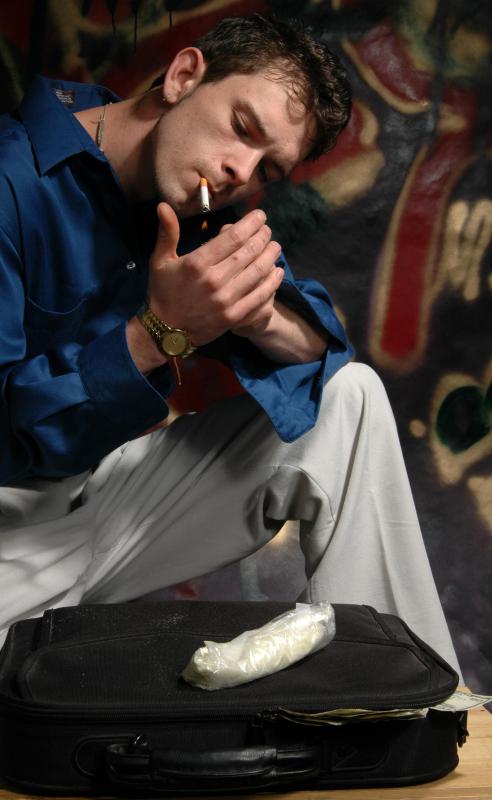At WiseGEEK, we're committed to delivering accurate, trustworthy information. Our expert-authored content is rigorously fact-checked and sourced from credible authorities. Discover how we uphold the highest standards in providing you with reliable knowledge.
What is an Addiction Intervention?
An addiction intervention is a gathering of friends and relatives of a drug addict or alcoholic. They are gathered for the purpose of getting the addicted person to seek treatment. To intervene means to get involved in a way to stop an action or activity; interventions are meant to prevent addicts from continuing to abuse substances such as alcohol or drugs. Intervene can also mean that an action or process is stopped due to an unplanned circumstance. This definition describes an addiction intervention from the addict's perspective, since he or she is not typically expecting the event to occur at that particular time.
For example, the addict is usually invited to a get together for a luncheon or other social activity with people close to him or her. Family and friends participating in the addiction intervention can't tell the person they are trying to help what the actual event is because it's extremely likely that he or she would not go. Interventions are held because addicts have previously refused to get help or have tried many times at rehabilitation, or rehab, and failed to find a solution for their addiction problem. Typically, addiction interventions offer the last hope for someone who has a life-threatening problem with drugs or alcohol.

When an addict shows up at the intervention and figures out what it is, the response is often anger at being tricked. Family and friends begin to read him letters they've prepared that express their love and concern for the addict. A certified substance abuse counselor, or interventionist, is usually at the meeting to guide the family as well as the addict through the addiction intervention. The counselor tries to keep the addict from leaving by confirming that the people in the room care deeply for him or her and are gathered in the hopes that their loved one will enter an addiction treatment center program.

Many addicts do stay to listen to their loved ones read their letters. The basic format of an addiction intervention letter is to first express love and positive feelings for the person, then identify the dangerous behavior. In identifying the addict's behavior, the letter writer uses "I" statements that shows he or she can no longer support or enable the addiction-related behavior. For instance, an addict's mother who is letting him stay at her home as well as giving some money to pay for drugs may write something like "I love you very much, but I'm worried that this addiction will kill you unless you agree to get help today. I can no longer support your habit or allow you to use drugs in my home; please get help today."

Once all the letters are read and the addict agrees to get help, the interventionist sees that the addict gets on an airplane or other transportation — usually by accompanying him or her — to get to a treatment center. If the addiction intervention is unsuccessful and the addict refuses to get help or bolts out the door, the interventionist typically has trained people follow the addict to keep trying to convince him or her to get help. Since family and friends no longer provide housing, drug money or other support, most addicts do eventually agree to get treatment.
AS FEATURED ON:
AS FEATURED ON:

















Discussion Comments
I don't know if I agree with the idea of staging an addiction intervention or not. A lot of people who become addicted to drugs or sex or food do it for some very deep psychological reasons. First of all, I'd be concerned about the wrong people participating in the addict intervention, like a sibling who sexually molested the addict or the friend who first introduced him or her to their drug of choice. I'd want to make sure the intervention specialist was aware of all the dynamics before letting people into that meeting.
I'd also be concerned about the addict's future recovery if the intervention went wrong. I understand people may have the best intentions, but someone with a heroin or cocaine addiction is still an adult. He or she has every legal right not to seek treatment for their personal problems. A successful intervention might get them to agree to enter an addiction center, but an unsuccessful one might send them deeper into their disease. I think everyone involved in a drug addiction intervention needs to understand the risks as well as the rewards.
I've only participated in one addiction intervention in my life, and I hope I never have to go through that experience again. My cousin had a real problem with alcohol, but he had a lot of friends and family members who quietly supplied him with it because he was the "life of the party" when he was drunk. The rest of us tried to get him into an addiction center and help him stay sober, but as soon as he would leave a program, all of his alcoholic friends would show up and get him drunk again.
We finally contacted a professional alcohol addiction intervention expert, and he helped us set up a meeting. It was supposed to look like a surprise birthday party at a local hotel. His wife drove him to the hotel and we were all waiting in one of the banquet rooms. As soon as he walked in the door, he knew what was about to happen. He didn't run, but I could tell he was really, really hurt by our deception. It was a rough meeting, but he did agree to go back to rehab. Some of our relatives also agreed to go to a special program for co-dependency, too.
Post your comments